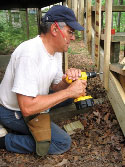 Last summer my wife and I moved into a neighborhood close to where we both grew up. The deck railing on our new home was too low and took away from the appearance of the house. We decided to replace it with an updated railing system. We were looking for something a little different but not too extravagant, and within our budget. We found a creative young woodworker who specializes in unique projects.
Last summer my wife and I moved into a neighborhood close to where we both grew up. The deck railing on our new home was too low and took away from the appearance of the house. We decided to replace it with an updated railing system. We were looking for something a little different but not too extravagant, and within our budget. We found a creative young woodworker who specializes in unique projects.After we hired him, the engineer came out in me. The craftsman and I had many conversations about various layouts, designs and the intricate details of making it all come together.
In one of the early discussions we identified a challenge in how the two rails would meet together in the corner. He hadn’t run up against this particular situation before and obviously, as an armchair deck builder, neither had I. We agreed to think about it and meet again the next day to make the final decision.
You know how your mind focuses when something captures your attention. Well, I was consumed by this problem. To me, it was an engineering challenge. On and off for the next 10 hours or so, I tried to visualize how to make it work. Then out of the blue, the solution came to me.
I sketched the design on a piece of paper. Yup, I figured it out! I was excited about having the answer and proud of unlocking the puzzle.
The next day at our progress meeting I began abruptly, “I figured out the corner thing.” I then went on to explain all the details of how to build the corners. I even told him how I came to the solution and how much time I spent thinking about it.
When I was done speaking, I looked at him and thought, “Oh my goodness, what have I done?” He had a polite, forced smile on his face. It was like I had taken the wind out of his sails.
I had not asked how he was doing or if he had any thoughts on how to tackle the problem. I was so focused on myself; I just dove headlong into my idea.
I realized that in my excitement I broke one of the cardinal rules in dealing with people. I acted in a way that did not appreciate his skills and abilities and in doing so slighted his dignity. My solution was right, but the way I was right was wrong. After I realized what happened, I apologized. He appreciated that and explained that he had not taken offense. Again, he was very generous.
My actions were not deliberate but that does not matter. If we expect people to give the best of themselves, we must acknowledge and honor the best in them. This begins by allowing people to use their gifts and talents and then by resisting the temptation to rescue someone at the first sign of a challenge, unless of course the risk of inaction demands you act. As difficult as it can be, you must recognize that “standing by” is sometimes necessary even when you have the answer or think you do.








Find Us on Socials